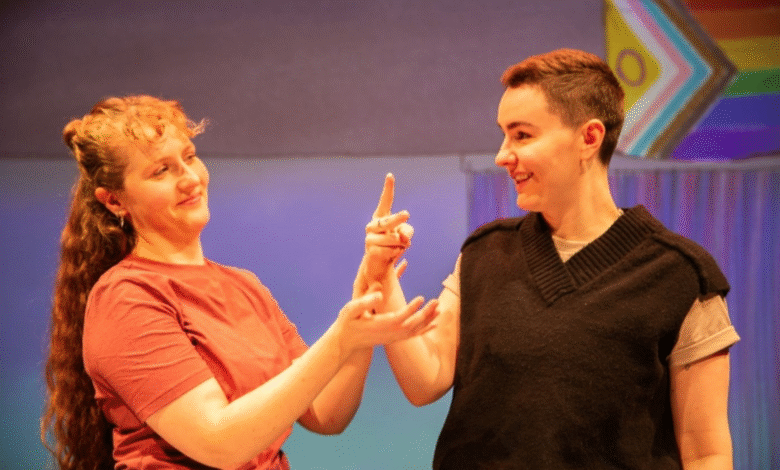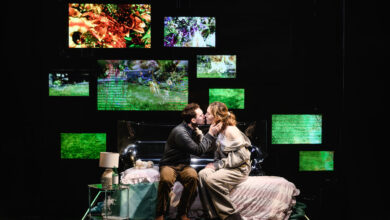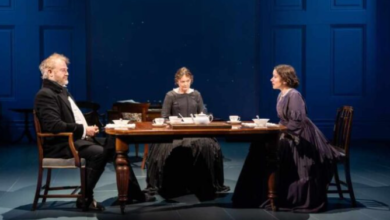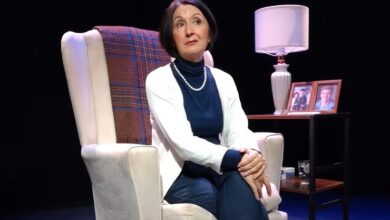Review: Barrier(s), Camden People’s Theatre
A movingly human, enlightening production, examining the difficulties encountered by a deaf and a hearing gay couple.Rating
Good!
It’s brilliant to see the growth in places supporting work by d/Deaf creatives in recent years across all sorts of venues, from Polka Theatre to the Royal Court. Now Barrier(s) at Camden People’s Theatre brings a team of talented deaf artists together to tell the movingly human and politically enlightening story of Alana (Em Prendergast) and Katie (Zoë McWhinney) and how they navigate life together in a world which is determined not to hear their difficulties.
Katie is deaf and meets Alana at a party. They’re instantly attracted, so swap numbers and start to text. It’s not easy, but they find ways to share commonalities and begin to understand each other better, falling in love. They are both passionate about their gay community and also about battling systemic injustice that sees deaf people frequently oppressed, pigeonholed as problematic or a burden on society. As their relationship evolves, we learn about the difficulties of being deaf, as well as seeing Katie as a complete, successful person.
Prendergast and McWhinney make for a superbly believable couple, with a crackling electricity between them. Prendergast’s Alana is charismatic and endearingly vulnerable as she negotiates learning to communicate with signing while discovering her own assumptions about deaf people. McWhinney does a brilliant job of presenting a highly competent, independent professional who is also unable to hear. She’s forthright but joyfully playful, and together they make a great team. Their romance refreshingly normalises being in a lesbian relationship by simply not overplaying it.
Eloise Pennycott’s script is highly enlightening to a hearing audience, systematically identifying areas in society where the deaf community are misrepresented or misunderstood and disclosing the negative attitudes and stigma that result in mistrust and anger from a passionate Katie. Simultaneously, it clarifies how there are often multiple ways to communicate understanding, actively demonstrating the possibilities that arise when we open up to paying attention and changing perspective, as it takes the audience along exactly that path. The play begins with spoken language when Alana first meets Katie, introducing signing supported by captions to translate between them. But as time goes on, there’s a complete shift, until towards the end of the show there is no spoken language at all, just signs and captioning: yet we still understand what’s happening and are actively engaged, with an understated musical soundtrack helping to provide emotional colour in what might otherwise be silence.
It’s initially hard work to shift visually between the surtitles and the performance happening concurrently, although this becomes easier with practice but the show as a whole feels long, with extra time required for captioning and action to align, so there’s sometimes a lag. This becomes more significant in the final scene, where the urgency is hampered by ‘live’ captioning. Without giving a spoiler, this twist of an ending is somewhat unsatisfying. The intention here is to decry disability trauma, but it just made me question why, when the play can so successfully normalise gay marriage, it couldn’t, in the same way, normalise deaf capability, writing a slightly different narrative instead. A transformation from ‘character’ to ‘real person’ here also doesn’t feel distinct enough, with the actions seeming juvenile rather than radical. Attacking the problem with a chainsaw might have more impact!
That said, there’s a lot to love and to learn about in this fascinating production, with great performances from the cast, who are a joy to watch and should certainly not be pigeonholed.
Written by Eloise Pennycott
Directed by Paula Garfield
You can read our interview with Em Prendergast here.
Barrier(s) plays at The Camden People’s Theatre Saturday 29 November






